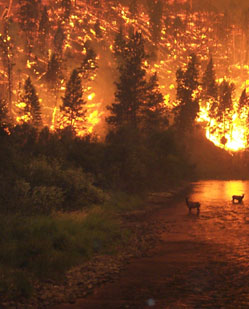Siberian Forest Fires: "Carbon Released from Soils Could Double The Greenhouse Effect"
2 Aug, 2007 02:08 pm
Heiko Balzter studies biosphere's responses to environmental change. He explains how climate change is altering fire regime in Siberian forests.
 Your study, which has been published in the Journal of Climate, finds that changing climate contributes to forest fires.
Your study, which has been published in the Journal of Climate, finds that changing climate contributes to forest fires.How is that?
What we studied in this paper was the effects of various climate phenomena on the vegetation seasonality in Siberia particularity and also on the fire regime. We did this by studying 18 years of satellite data, which were used to derive indicators of the start, peak, and the end of the growing season, which is basically the summer time when the vegetation is photo-synthetically active.
The first indicators showed quite a bit of variability over that time scale, and in particular there were some significant findings. First, we could detect for all land cover types that we studied that the onset of spring tended to occur earlier than the more recent past. There is an earlier onset of spring that has been observed in other areas such as in the UK from ground data, which we picked up from satellite data. Basically this is also happening in Siberia. It is warming twice as fast as the global average. This has quite a profound impact on the impact of the Siberian ecosystem.
How does this affect the growing cycle?
Spring tends to start earlier, which means that the growing season tends to lengthen a little. That means that the vegetation is photo-synthetically active for longer. Some people have argued that you have an increased greenhouse uptake from the atmosphere, because the vegetation absorbs carbon for a longer period of time during the year. This may be true in principle, but there may be some limiting factors such as drought if the vegetation doesn’t have enough water due to a summer drought, for example, where the photosynthesis is severely limited. Over the same kind of time period when people began keeping good climate records, lets say the last 100 years to 150 years since industrialization started, the temperature in Siberia has gone up by about 2 degrees. In addition, particularly the fire regime plays an important role in regulating the vegetation. As it happens, Russian scientists have observed that the fire regime has accelerated quite a lot. Statistically, in the last century a typical forest in Siberia burned once every hundred years. According to new observations by Russian scientists, they have observed that this interval has now shorted to 65 years, which is almost twice as fast. That means that the vegetation burns more frequently, which really disturbs the forests ability to take up carbon in the summer because obviously fires release carbon into the atmosphere.
What are the implications of this in terms of the Biosphere?
One implication of an accelerating fire regime will lead to the release of more carbon from the soil carbon pool. The carbon is not only stored in the vegetation but also in the organic soil. If that is being released, that will accelerate the greenhouse effect. There has been a study by Koffman and co-authors, which was published in Nature a while back that estimated the carbon released from soils globally as a result of climate change could about double the greenhouse effect as a result of human activity and industrialization.
Interview by: Christopher Le Coq
Heiko Balzter is a professor of Physical Geography at the University of Leicester in the UK.
Reference: Journal of Climate 20:15, 3713–3729, doi: 10.1175/JCLI4226
Picture credit: The Elk Bath picture was taken by the Alaskan Type I Incident Management Team on August 6, 2000 on the East Fork of the Bitterroot River on the Sula Complex. This photograph was taken with a digital camera and is not available in high resolution. If you use this photo, please credit the Alaskan Type I Incident Management Team. Photographer: John McColgan, Bureau of Land Management, Alaska Fire Service. (updated 2 August 5:30 pm)







CAL FIRE NEWS
[Response] I fully agree. The picture was taken from Wikimedia Common. The credit is logged in our database but not displayed on the site now due to a technical issue that should be fixed very soon (hopefully next week). The editor.